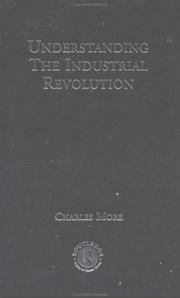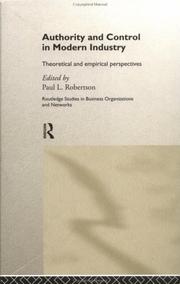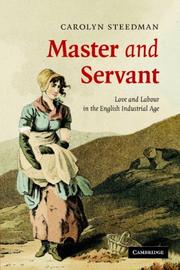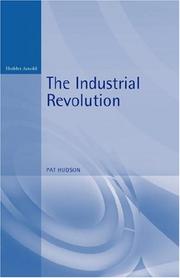| Listing 1 - 10 of 10 |
Sort by
|

ISBN: 0415108691 0415108683 1134839065 1283707934 9786612777639 0203059433 0585448655 9780415108690 1134839057 Year: 1994 Publisher: London ; New York : Routledge,
Abstract | Keywords | Export | Availability | Bookmark
 Loading...
Loading...Choose an application
- Reference Manager
- EndNote
- RefWorks (Direct export to RefWorks)
Was the Industrial Revolution Necessary? takes an innovative look at this much studied subject. The contributors ask new questions, explore new issues and use new data in order to stimulate interest and elicit new responses. By looking at it from such previously unexplored angles the book brings a new understanding to the Industrial Revolution and opens a new debate.
History of Europe --- anno 1800-1999 --- Industrial revolution --- Industriële revolutie --- Révolution industrielle --- Industrial revolution. --- Social history. --- REVOLUTION INDUSTRIELLE --- EUROPE --- CONDITIONS ECONOMIQUES --- BIBLIOGRAPHIE --- INDUSTRIE --- HISTOIRE --- 19E SIECLE --- 19E-20E SIECLES --- 18E-20E SIECLES --- 18E-19E SIECLES --- HISTOIRE ECONOMIQUE

ISBN: 0415184045 0415184053 9786610354436 020319019X 0203136977 1280354437 1134670087 9780203190197 9780203136973 9780415184045 9780415184052 9781134670086 9781134670031 1134670036 9781134670079 1134670079 Year: 2000 Publisher: London New York Routledge
Abstract | Keywords | Export | Availability | Bookmark
 Loading...
Loading...Choose an application
- Reference Manager
- EndNote
- RefWorks (Direct export to RefWorks)
Each aspect of the Industrial Revolution in Britain is discussed in depth, focusing on the important debates and reviewing the most recent research.
Industrial revolution --- Révolution industrielle --- Industrial revolution. --- AA / International- internationaal --- 331.12 --- 331.100 --- Geschiedenis van de industrie. --- Economische geschiedenis: algemeenheden. --- Révolution industrielle --- Revolution, Industrial --- Economic history --- Social history --- Economische geschiedenis: algemeenheden --- Geschiedenis van de industrie
Book
ISBN: 9781474286183 1474286186 9781474286176 1474286178 9781474286169 147428616X 9781474286466 1474286461 1474286194 Year: 2017 Publisher: [London] : Bloomsbury Academic,
Abstract | Keywords | Export | Availability | Bookmark
 Loading...
Loading...Choose an application
- Reference Manager
- EndNote
- RefWorks (Direct export to RefWorks)
"The British Industrial Revolution has long been seen as the spark for modern, global industrialization and sustained economic growth. Indeed the origins of economic history, as a discipline, lie in 19th-century European and North American attempts to understand the foundation of this process. In this book, William J. Ashworth questions some of the orthodoxies concerning the history of the industrial revolution and offers a deep and detailed reassessment of the subject that focuses on the State and its role in the development of key British manufactures. In particular, he explores the role of State regulation and protectionism in nurturing Britain's negligible early manufacturing base. Taking a long view, from the mid 17th century through to the 19th century, the analysis weaves together a vast range of factors to provide one of the fullest analyses of the industrial revolution, and one that places it firmly within a global context, showing that the Industrial Revolution was merely a short moment within a much larger and longer global trajectory. This book is an important intervention in the debates surrounding modern industrial history will be essential reading for anyone interested in global and comparative economic history and the history of globalization."--Bloomsbury Publishing.
E-books --- BUSINESS & ECONOMICS --- Economic history. --- General & world history. --- Industrial revolution. --- Industrialisation & industrial history. --- Modern history to 20th century: c 1700 to c 1900. --- Industries --- General. --- Révolution industrielle --- Revolution, Industrial --- Economic history --- Social history --- Industrial revolution
Book
ISBN: 9780521847568 9780511780455 9780521248969 9780511932434 051193243X 9780511927256 0511927258 9780511929755 0511929757 0511780451 0511924712 9780511924712 0521847567 0521248965 110720982X 0511852282 1282918656 9786612918650 0511931093 Year: 2011 Publisher: Cambridge, UK New York Melbourne : Cambridge University Press,
Abstract | Keywords | Export | Availability | Bookmark
 Loading...
Loading...Choose an application
- Reference Manager
- EndNote
- RefWorks (Direct export to RefWorks)
This is a unique account of working-class childhood during the British industrial revolution, first published in 2010. Using more than 600 autobiographies written by working men of the eighteenth and nineteenth centuries Jane Humphries illuminates working-class childhood in contexts untouched by conventional sources and facilitates estimates of age at starting work, social mobility, the extent of apprenticeship and the duration of schooling. The classic era of industrialisation, 1790-1850, apparently saw an upsurge in child labour. While the memoirs implicate mechanisation and the division of labour in this increase, they also show that fatherlessness and large subsets, common in these turbulent, high-mortality and high-fertility times, often cast children as partners and supports for mothers struggling to hold families together. The book offers unprecedented insights into child labour, family life, careers and schooling. Its images of suffering, stoicism and occasional childish pleasures put the humanity back into economic history and the trauma back into the industrial revolution.
Child labor --- Childhood --- Industrial revolution --- History. --- thuisarbeid --- industriële revolutie --- huisarbeid --- History of the United Kingdom and Ireland --- anno 1700-1799 --- anno 1800-1899 --- Children --- Employment of children --- Labor --- Age and employment --- Kids (Children) --- Pedology (Child study) --- Youngsters --- Age groups --- Families --- Life cycle, Human --- History --- Employment --- kinderarbeid --- Groot-Brittannië --- E-books --- Arts and Humanities --- Enfants --- Révolution industrielle --- Travail --- Grande-Bretagne --- Histoire --- Groot-Brittannië.
Multi
ISBN: 9780521766937 9780521131858 0521766931 0521131855 9780511779619 9780511918292 0511918291 0511779615 1282818600 9781282818606 9780511914522 0511914520 9780511916328 0511916329 0511851618 9780511851612 1107208998 9781107208995 9786612818608 6612818603 0511917317 9780511917318 0511912714 9780511912719 Year: 2010 Publisher: Cambridge New York Cambridge University Press
Abstract | Keywords | Export | Availability | Bookmark
 Loading...
Loading...Choose an application
- Reference Manager
- EndNote
- RefWorks (Direct export to RefWorks)
The industrial revolution transformed the productive power of societies. It did so by vastly increasing the individual productivity, thus delivering whole populations from poverty. In this new account by one of the world's acknowledged authorities the central issue is not simply how the revolution began but still more why it did not quickly end. The answer lay in the use of a new source of energy. Pre-industrial societies had access only to very limited energy supplies. As long as mechanical energy came principally from human or animal muscle and heat energy from wood, the maximum attainable level of productivity was bound to be low. Exploitation of a new source of energy in the form of coal provided an escape route from the constraints of an organic economy but also brought novel dangers. Since this happened first in England, its experience has a special fascination, though other countries rapidly followed suit.
History of the United Kingdom and Ireland --- anno 1800-1899 --- Révolution industrielle --- --Angleterre --- --Énergie --- --Histoire économique et sociale --- --Industrie --- --Power resources --- Coal trade --- Industrial revolution --- Charbon --- Ressources énergétiques --- History. --- Commerce --- History --- 620.9 <41> --- 338 <09> <41> --- Economics of energy in general--Verenigd Koninkrijk van Groot-Brittannië en Noord-Ierland --- Economische geschiedenis--Verenigd Koninkrijk van Groot-Brittannië en Noord-Ierland --- Power resources --- 338 <09> <41> Economische geschiedenis--Verenigd Koninkrijk van Groot-Brittannië en Noord-Ierland --- Energy --- Energy resources --- Power supply --- Natural resources --- Energy harvesting --- Energy industries --- Coal industry --- Fuel trade --- Énergie --- Histoire économique et sociale --- Industrie --- Power resources - Great Britain - History. --- Coal trade - Great Britain - History. --- Industrial revolution - Great Britain. --- Révolution industrielle - Grande-Bretagne --- Charbon - Commerce - Grande-Bretagne - History --- Ressources énergétiques - Grande-Bretagne - History --- Angleterre

ISBN: 0415132126 1138865826 9786612778469 113482730X 0203435400 1282778463 0429231709 9780203435403 9780415132121 9781134827305 9781134827251 1134827253 9781134827299 1134827296 9781138865822 9781282778467 6612778466 9780429231704 Year: 1999 Publisher: London New York Routledge
Abstract | Keywords | Export | Availability | Bookmark
 Loading...
Loading...Choose an application
- Reference Manager
- EndNote
- RefWorks (Direct export to RefWorks)
This book takes a variety of theoretical and empirical approaches to the issue of organization and authority in the modern corporation and includes contributions from scholars in the US, Germany and Japan.
Industrial management --- Labor --- Industrial organization --- Industrial revolution --- Authority --- Gestion d'entreprise --- Travail --- Industrie --- Révolution industrielle --- Autorité --- History --- Case studies --- Histoire --- Cas, Etudes de --- Organisation, contrôle, etc --- Organisation, contrôle, etc. --- Industrial management - History. --- Business. --- Management --- Business & Economics --- Management Theory --- Industrial revolution. --- History. --- Révolution industrielle --- Autorité --- Organisation, contrôle, etc --- Organisation, contrôle, etc. --- Revolution, Industrial --- Industries --- Labor and laboring classes --- Organization --- Political science --- Authoritarianism --- Consensus (Social sciences) --- Economic history --- Social history --- Industrial concentration --- Industrial sociology --- Manpower --- Work --- Working class

ISBN: 9780521697736 9780521874465 0521697735 0521874467 9786610959693 0511295782 0511294212 0511573820 0511618948 128095969X 051129655X 0511295014 9780511618949 1107181658 9780511296550 0511292619 9780511292613 9780511295782 9780511294211 9780511295010 6610959692 9781107181656 9780511573828 Year: 2007 Volume: 10 Publisher: Cambridge New York Cambridge University Press
Abstract | Keywords | Export | Availability | Bookmark
 Loading...
Loading...Choose an application
- Reference Manager
- EndNote
- RefWorks (Direct export to RefWorks)
Leading historian Carolyn Steedman offers a fascinating and compelling account of love, life and domestic service in eighteenth-century England. This book, situated in the regional and chronological epicentre of E. P. Thompson's The Making of the English Working Class and Emily Bronte's Wuthering Heights, focuses on the relationship between a Church of England clergyman (the Master of the title) and his pregnant maidservant in the late eighteenth century. This case-study of people behaving in ways quite contrary to the standard historical account sheds new light on the much wider historical questions of Anglicanism as social thought, the economic history of the industrial revolution, domestic service, the poor law, literacy, education, and the very making of the English working class. It offers a unique meditation on the relationship between history and literature and will be of interest to scholars and students of industrial England, social and cultural history and English literature.
Household employees in literature --- Master and servant in literature --- Labor --- Master and servant --- Industrial revolution --- Employés de maison dans la littérature --- Employeur et employé dans la littérature --- Travail --- Employeur et employé (Droit) --- Révolution industrielle --- History --- Histoire --- Great Britain --- Grande-Bretagne --- Social conditions --- Conditions sociales --- Domestics in literature --- Master and servant in literature. --- Geschiedenis van opvoeding en onderwijs --- England --- handboeken en inleidingen --- Arts and Humanities --- handboeken en inleidingen. --- Employés de maison dans la littérature --- Employeur et employé dans la littérature --- Employeur et employé (Droit) --- Révolution industrielle --- Revolution, Industrial --- Economic history --- Social history --- Contracts --- Hire --- Labor and laboring classes --- Manpower --- Work --- Working class --- Law and legislation --- Household employees in literature.
Multi
ISBN: 9780521895026 0521895022 9780521719254 0521719259 0511409931 9786611717100 0511409397 0511407297 051181819X 128171710X 051140803X 0511408846 9780511818196 1107187710 9780511409936 9780511409394 9780511408847 9780511408038 9781107187719 6611717102 9780511407291 Year: 2009 Publisher: Cambridge ; New York : Cambridge University Press,
Abstract | Keywords | Export | Availability | Bookmark
 Loading...
Loading...Choose an application
- Reference Manager
- EndNote
- RefWorks (Direct export to RefWorks)
In the long eighteenth century, new consumer aspirations combined with a new industrious behavior to fundamentally alter the material cultures of northwest Europe and North America. This 'industrious revolution' is the context in which the economic acceleration associated with the Industrial Revolution took shape. This study explores the intellectual understanding of the new importance of consumer goods as well as the actual consumer behavior of households of all income levels. De Vries examines how the activation and evolution of consumer demand shaped the course of economic development, situating consumer behavior in the context of the household economy. He considers the changing consumption goals of households from the seventeenth century to the present and analyzes how household decisions have mediated between macro-level economic growth and actual human betterment. Ultimately, de Vries' research reveals the strengths and weaknesses of existing consumer theory, suggesting revisions that add historical realism to economic abstractions.
Consumption (Economics) --- Consumers --- History. --- 338 <09> --- Economische geschiedenis --- 338 <09> Economische geschiedenis --- 331.100 --- 331.14 --- 339.320 --- AA / International- internationaal --- Customers (Consumers) --- Shoppers --- Persons --- History --- Economische geschiedenis: algemeenheden --- Geschiedenis van de prijzen, de lonen en de verdeling van de rijkdom --- Consumptie: algemeenheden. Wet van de vraag in verband met de consumptie. Consumptiebehoefte. Behoeftetheorie --- History of North America --- History of Europe --- anno 1600-1699 --- anno 1800-1999 --- Arts and Humanities --- Home economics --- Economie domestique --- Consommation (Economie politique) --- Consommateurs --- Histoire --- Consumption (Economics) - History --- Consumers - History --- Consommation --- Révolution industrielle --- Économie domestique --- Influence --- Révolution industrielle --- Économie domestique

ISBN: 0713165316 1322106371 1474225489 9780713165319 Year: 2014 Publisher: London, [England] ; New York, [New York] : Hodder Arnold,
Abstract | Keywords | Export | Availability | Bookmark
 Loading...
Loading...Choose an application
- Reference Manager
- EndNote
- RefWorks (Direct export to RefWorks)
This is an introduction to the Industrial Revolution which offers an integrated account of the economic and social aspects of change during the period. Recent revisionist thinking has implied that fundamental change in economic, social and political life at the time of the Industrial Revolution was minimal or non-existent. The author challenges this interpretation, arguing that the process of revision has gone too far; emphasizing continuity at the expense of change and neglecting many historically unique features of the economy and society. Elements given short shrift in many current interpre
Industrial policy --- -Industrial revolution --- -Revolution, Industrial --- Economic history --- Social history --- Business --- Industries --- Industry and state --- Economic policy --- Historiography --- Government policy --- Great Britain --- Economic conditions --- -Historiography. --- Social conditions --- Industrial revolution --- Revolution, Industrial --- Historiography. --- Révolution industrielle --- --Grande-Bretagne --- --Historiographie --- --Historiography --- Politique industrielle --- Révolution industrielle --- Historiographie --- Grande-Bretagne --- Conditions économiques --- Conditions sociales --- Great Britain - Industries - Historiography. --- Industry and state - Great Britain - Historiography. --- Great Britain - Economic conditions - Historiography. --- Great Britain - Social conditions - Historiography. --- Industrial policy - Historiography - Great Britain --- Industrial revolution - Historiography - Great Britain --- Great Britain - Economic conditions - Historiography --- Great Britain - Social conditions - Historiography
Book
ISBN: 0773508406 9786612855603 1282855603 0773562931 9780773562936 Year: 1991 Publisher: Montreal : McGill-Queen's University Press,
Abstract | Keywords | Export | Availability | Bookmark
 Loading...
Loading...Choose an application
- Reference Manager
- EndNote
- RefWorks (Direct export to RefWorks)
Szostak develops a model that establishes causal links between transportation and industrialization and shows how improvements in transportation could have a beneficial effect on an economy such as that of eighteenth-century England. This model shows the Industrial Revolution to involve four primary phenomena: increased regional specialization, the emergence of new industries, an expanding scale of production, and an accelerated rate of technological innovation. Through detailed analysis, Szostak explicates the effects of the different systems of transportation in France and England on the four components of the Industrial Revolution. He outlines the development in late eighteenth-century England of a reliable system of all-weather transportation, made up of turnpike roads and canals, that was far superior to the system in France at the same period. He goes on to examine in detail the iron, textile, and pottery industries in each country, focusing on the effect of the quality of available transportation on the decisions of individual entrepreneurs and innovators. Szostak shows that in every case these industries were more highly developed in England than in France.
History of the United Kingdom and Ireland --- History of France --- Transport. Traffic --- anno 1700-1799 --- 338 <09> <44> --- 338 <09> <420> --- 656 --- Transportation --- -Transportation --- -Industrial revolution --- -Revolution, Industrial --- Economic history --- Social history --- Public transportation --- Transport --- Transportation, Primitive --- Transportation companies --- Transportation industry --- Locomotion --- Commerce --- Communication and traffic --- Storage and moving trade --- Economische geschiedenis--Frankrijk --- Economische geschiedenis--Engeland --- Transport and postal services. Traffic organization and control --- History --- -History --- -Economic aspects --- England --- -France --- -England --- -Industries --- -Economic conditions --- -338 <09> <44> --- -Economische geschiedenis--Frankrijk --- 656 Transport and postal services. Traffic organization and control --- 338 <09> <420> Economische geschiedenis--Engeland --- 338 <09> <44> Economische geschiedenis--Frankrijk --- -History of the United Kingdom and Ireland --- -656 Transport and postal services. Traffic organization and control --- Revolution, Industrial --- -Angleterre --- Anglii︠a︡ --- Inghilterra --- Engeland --- Inglaterra --- Anglija --- Pʻŭrangsŭ --- Frankrig --- Francja --- Frant︠s︡ii︠a︡ --- Prantsusmaa --- Francia (Republic) --- Tsarfat --- Tsorfat --- Franḳraykh --- Frankreich --- Fa-kuo --- Faguo --- Франция --- French Republic --- République française --- Peurancih --- Frankryk --- Franse Republiek --- Francland --- Frencisc Cynewīse --- فرنسا --- Faransā --- Franza --- Republica Franzesa --- Gallia (Republic) --- Hyãsia --- Phransiya --- Fransa --- Fransa Respublikası --- Franse --- Францыя --- Frantsyi︠a︡ --- Французская Рэспубліка --- Frantsuzskai︠a︡ Rėspublika --- Parancis --- Pransya --- Franis --- Francuska --- Republika Francuska --- Bro-C'hall --- Френска република --- Frenska republika --- França --- República Francesa --- Pransiya --- Republikang Pranses --- Γαλλία --- Gallia --- Γαλλική Δημοκρατία --- Gallikē Dēmokratia --- فرانسه --- Farānsah --- צרפת --- רפובליקה הצרפתית --- Republiḳah ha-Tsarfatit --- פראנקרייך --- 法国 --- 法蘭西共和國 --- Falanxi Gongheguo --- フランス --- Furansu --- フランス共和国 --- Furansu Kyōwakoku --- Francija --- Ranska --- Frankrike --- Industries --- Industrial revolution --- Economic aspects --- France --- Economic conditions --- Metal trade --- Textile industry --- E-books --- Textile industry and fabrics --- Textiles industry --- Manufacturing industries --- Metal industries --- 656 Transport en postdiensten. Verkeersorganisatie en controle --- Transport en postdiensten. Verkeersorganisatie en controle --- Industrie --- Révolution industrielle --- Conditions économiques
| Listing 1 - 10 of 10 |
Sort by
|

 Search
Search Feedback
Feedback About UniCat
About UniCat  Help
Help News
News